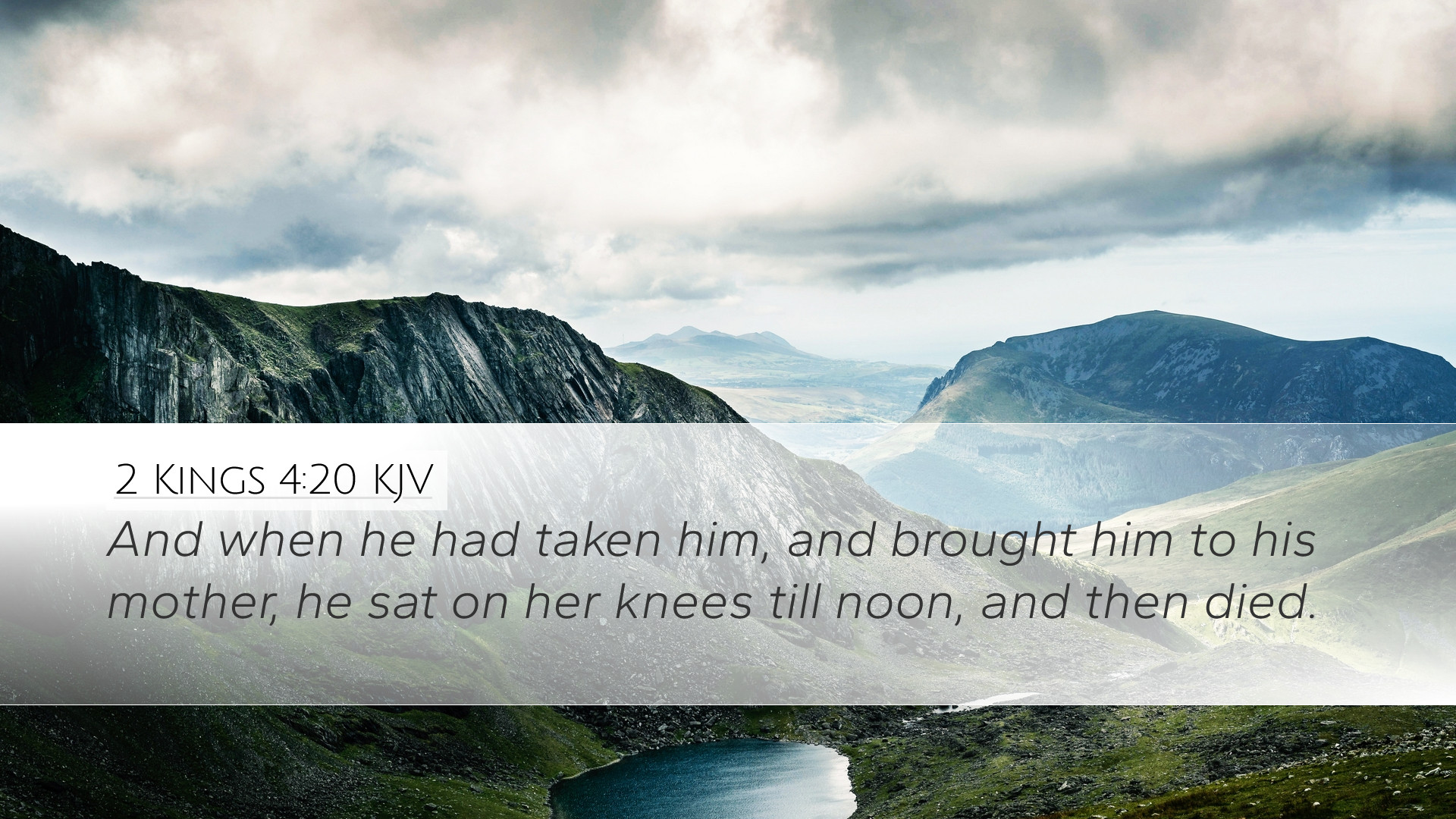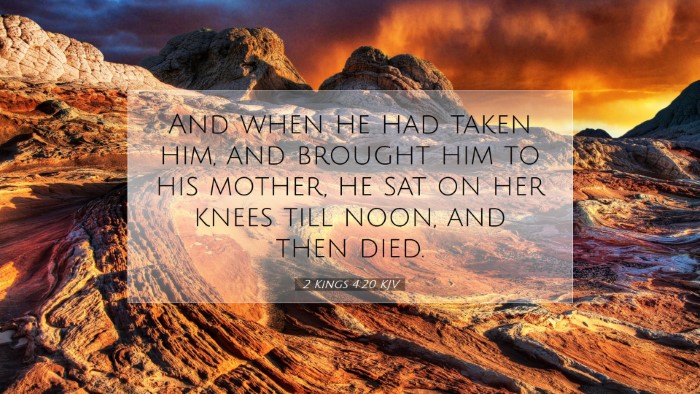Commentary on 2 Kings 4:20
Verse Text: "And when he had taken him, and brought him to his mother, he sat on her knees till noon, and then died."
Introduction
The account in 2 Kings 4:20 encapsulates a profound moment in the life of the Shunammite woman and her son, showcasing themes of grief, hope, and divine intervention. This commentary seeks to draw from esteemed public domain commentaries to illuminate the context and theological implications of this significant verse.
Contextual Background
The narrative unfolds within the broader story of the prophet Elisha, who is noted for performing miracles and acting as a channel of God’s power. The Shunammite woman, recognized for her hospitality towards Elisha, is pivotal to this account. Her relationship with the prophet and her unwavering faith highlight critical aspects of God’s grace and purpose.
Exegesis of the Verse
The phrase "he sat on her knees till noon" can be unpacked to reveal a moment of tenderness and affection, but also impending tragedy. Henry notes how the act of bringing the son to his mother signifies her deep bond with him and reflects a common practice of nurturing, emphasizing the mother's integral role in the child's life.
Grief and Loss
Barnes elaborates on the heart-wrenching nature of the boy's death. The Shunammite’s agony is palpable, illustrating a mother's love that is met with sudden despair. The contrast between the child's warmth in her embrace and the chilling reality of his death serves as a poignant commentary on the unpredictable nature of life.
This verse serves as a theological reflection on human suffering, pointing to the reality that even the most faithful experience pain and loss. The fatal consequence of illness, which strikes a beloved family member, urges readers to consider the transient nature of life and the importance of faith in times of trial.
The Mother’s Response
Adam Clarke provides insights into the emotional landscape of the Shunammite mother. Her character is resilient—despite the calamity, she does not succumb to despair immediately. Instead, she retains an underlying hope that eventually leads her back to Elisha. Her response demonstrates an unyielding faith, as she takes the alarming situation in stride, indicating a profound trust in God’s prophets and ultimately in God Himself.
Theological Themes
- Faith and Restoration: The Shunammite entreats Elisha, thereby signaling her faith in God’s continued work through the prophet. This reflects the broader biblical theme where God responds to the cries of His people, showcasing His ability to restore what is lost.
- The Role of Intercessory Prayer: Elisha's later actions lead to a miraculous restoration of the child’s life. This highlights the significant role of prayer and intercession, emphasizing that in the realm of divine miracles, fervent prayer is foundational.
- Hope Amidst Suffering: The narrative reflects the necessity of maintaining hope, even in the gravest circumstances. The Shunammite woman’s journey is one of faith, confronting grief but moving forward toward restoration, which serves as an encouragement to those enduring trials.
Practical Applications
For modern readers, particularly pastors and theologians, this verse serves as a rich source of reflection on the nature of God’s presence in crisis. Emphasizing the importance of faith and reliance on God during personal tragedies, one can derive various applications:
- Encouragement in Grief: Pastors can encourage grieving families, helping them understand that feeling sorrow does not equate to a loss of faith.
- Empowerment to Intercede: The narrative encourages the community to embody the call to prayer, fostering a culture where intercessory prayer becomes commonplace in church life.
- Understanding Divine Timing: The passage prompts believers to acknowledge God’s sovereignty and timing in their lives, teaching patience and trust in His unfolding plan.
Conclusion
2 Kings 4:20 is a verse rich with emotional depth and theological significance. Through the lens of the Shunammite woman’s anguish and unwavering faith, we find profound truths about God’s providential care, the power of prayer, and the hope of restoration. As believers reflect on this passage, may they be reminded of God's omnipotence in their moments of grief, and may they be inspired to pursue faith amidst adversity.


